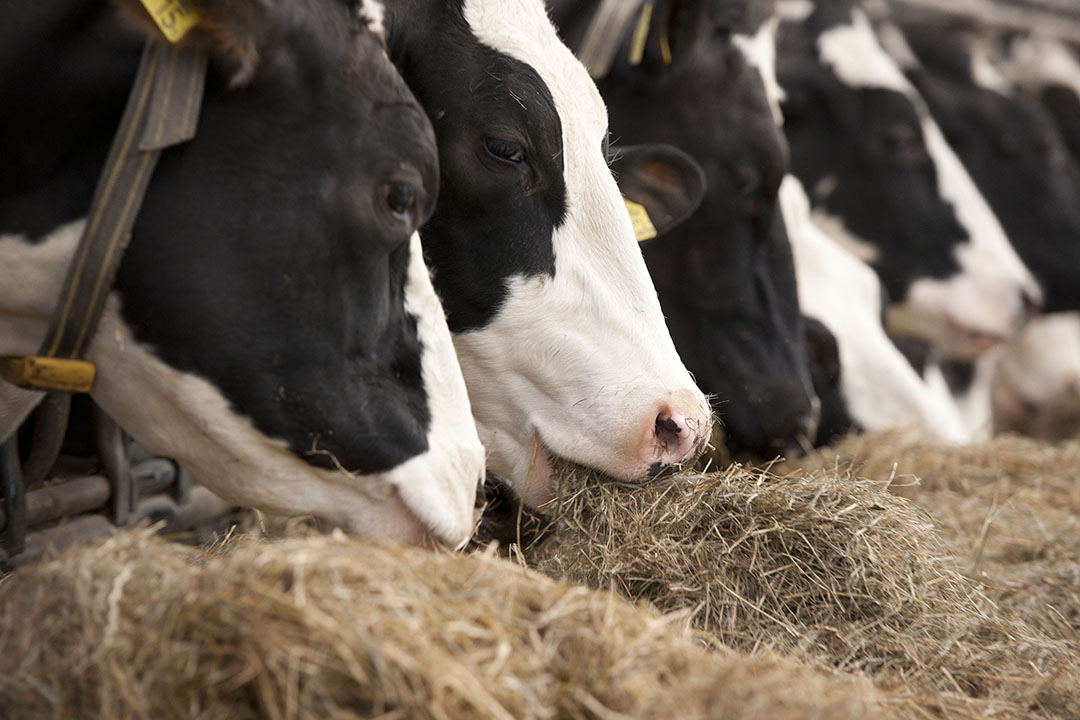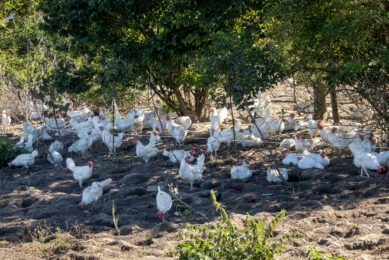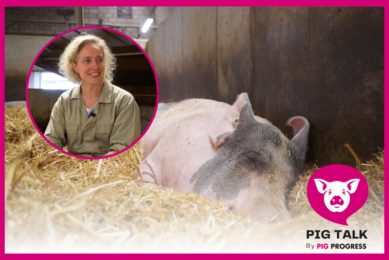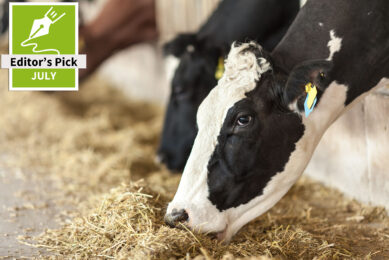Betaine: An effective rumen modulator

Natural betaine promotes microbial fermentation activity, as an effective rumen modulator, especially in a time of heat-stressed rumen. The rumen microbes may take a full benefit of available betaine and use it against thermal stress in a way that helps to maintain their fermentation activities, crucial for ruminant health and productivity.
In the ruminant sector, the intensification of modern dairy farming and the genetic improvements for milk production may contribute to the increased incidence of heat stress. Specialists observed that high yielding dairy cows, producing more than 35 kg milk/day, suffer more from heat stress than low producing dairy cattle. The interaction between temperature and relative humidity must be taken into account, measured by the temperature humidity index (THI). THI is the most commonly used index to measure the level of heat stress in animals. According to available research data, in high-yielding cows heat stress can occur at a temperature of 21°C with a relative humidity (RH) of 75%; and 24°C with a RH of 25%, which means a lower THI (68 instead of 72).
Dairy cattle experiencing heat stress will reduce their feed intake. Due to reduced intake of nutrients and increased energy demand for thermoregulation, the milk production may decrease by 10-15% (even by 40-50% in severe cases). Additionally, the milk composition may be also negatively affected. Long-term exposure on heat stress has adverse effects on the reproductive performances. As a consequence, heat stress can lead to dramatic economic losses.
Nutritional solutions to beat heat stress
Besides technical solutions (cooling, ventilation) which improve the housing conditions under high temperatures, nutrition strategies are gaining in interest as a useful solution to counteract heat stress. Natural betaine is a multifunctional nutrient. It is well-studied and successfully used in diets of monogastric animals, as a proven nutritional aid to protect against heat and osmotic stress. As an excellent organic osmolyte, betaine restores and maintains cellular integrity and functionality, and it prevents dehydration.
As a methyl group donor, betaine provides methyl groups for synthesis of numerous substances, intermediates in protein and energy metabolism, and it is involved in the DNA methylation. Furthermore, betaine is utilised with high efficiency in fermentation processes, in order to increase the output of the final product.
In ruminants, microbial metabolism of betaine is known, but the extent to which ruminal microbes utilise betaine has been under-explored. Micro-organisms can use betaine as an osmolyte to adapt to fluctuation in external stressors and as a potent methyl group donor. Because of these properties, betaine could modulate ruminal fermentation and might be more significant to ruminal microbes when they are under stressors like heat and high osmolarity. In collaboration with the team of Professor Qendrim Zebeli at the University of Veterinary Medicine Vienna, Austria, a recent in vitro study was carried out, which aimed to test natural betaine from ActiBeet L, as a possible effective rumen modulator under normal physiological and stressed rumen conditions.
A rumen simulation technique (RUSITEC) was used to evaluate the dose effects of betaine supplementation on rumen fermentation variables, microbiome, and nutrient digestibility under normal, heat-stressed, and hyperosmotic-stressed rumen conditions. The basal diets were rich in non-fibre carbohydrates representing a common diet for high-yielding dairy cattle. Three different betaine doses (Actibeet L, 40% betaine) were used: 0% (control), 0.3% of diet DM (low), and 1.7% of diet DM (high).
Each dose was tested under 2 incubation temperatures:
- normal rumen temperature and
- heat-stressed rumen;
And 2 osmotic conditions including:
- normal rumen osmolality
- hyperosmotic condition.
The osmolality and pH of incubation fluid for normal and hyperosmotic conditions were successfully established via the amount of concentrate in the diet and modified buffer. There were six runs in total, each run included the adaptation and measurement periods to determine fermentation characteristics. All trial data were analysed by the MIXED procedure of SAS.
Figure 1 – The concentration of total SCFA in incubation fluid (mmol/l).
Short-chain fatty acids gains
The most significant finding was that betaine supplementation increased the concentration of short-chain fatty acids (SCFA) in heat-stressed rumen condition (Figures 1 and 2). SCFA are a major source of energy in ruminants providing up to 75% of the metabolisable energy. Without betaine, the heat-stressed condition clearly decreased the SCFA concentration, supporting that heat stress leads to depressed milk production. The negative effect of heat stress on suppressed SCFA concentration disappeared when betaine was added, and the concentration of the SCFA increased linearly with betaine dose. Under normal rumen conditions betaine is converted to acetate, which is the building block for milk fat synthesis; but under the hyperosmotic rumen condition, betaine shifted the SCFA towards more propionate. Propionate is the most important glucogenic precursor required for lactose, which is responsible for milk yield in ruminants.
Figure 2 – The concentration of total SCFA expressed per amount of degraded organic matter (mmol/mg OM degraded) as affected by betaine supplementation and heat-stressed rumen condition.
From the data, the biggest difference on SCFA between treatments, was +10 mmol/L (high dose vs. control), both under heat stressed rumen conditions. Considering a dairy cow with the rumen capacity of 100 L, the increased level would be equal to 1000 mmol/d, therefore more SCFA available for maintenance and production. From this point of view, the data suggests that betaine can support the milk production during heat stress. The in vitro dosage, (tested for grain-reach diets for high yielding dairy cattle), after factor correction, can be translated into the following practical dose: 6 g of betaine/cow/d, as practical low dose; and 36g of betaine/cow/d, as a practical high dose. For the optimum betaine dose rate the interaction between diet, productivity, temperature and humidity conditions must be considered.
In conclusion, the data shows that heat and hyperosmotic stress clearly suppressed rumen fermentation. Betaine supplemented to grain-rich diets promoted the microbial fermentation leading to more SCFA production under heat stress conditions, which otherwise was detrimental to rumen fermentation activity.
Agrana would like to thank Dr Ratchaneewan Khiaosa-ard, from the Institute of Animal Nutrition and Functional Plant Compounds, Department of Farm Animals and Veterinary Public Health, University of Veterinary Medicine Vienna, for her commitment to this project.
References available on request
Author: Ana Gavrău, Global Product Manager, Agrana Stärke









